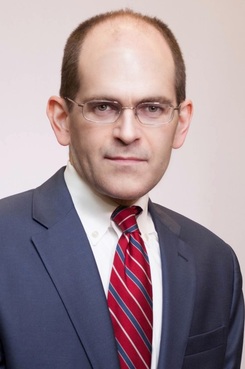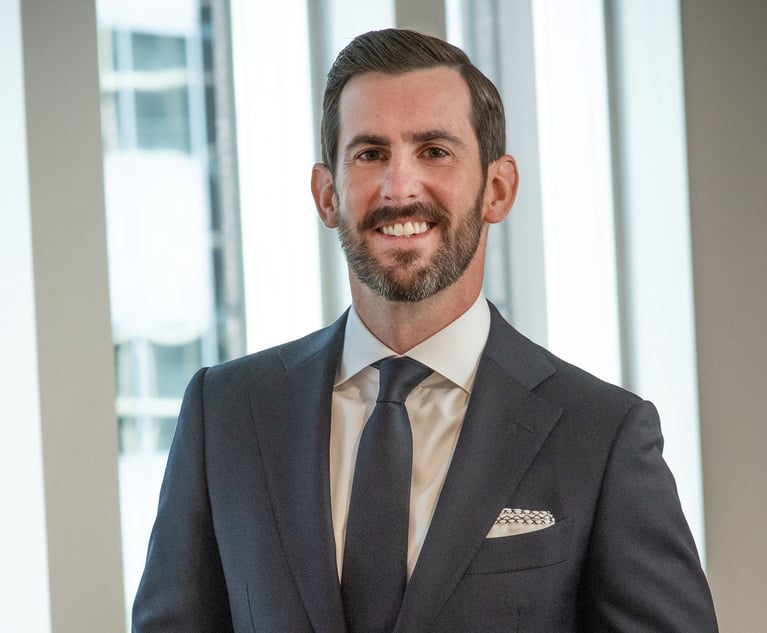Four Takeaways From the ABA Institute's Blockchain Conference
I recently attended the American Bar Association's annual institute on blockchain technology, digital currency, and ICOs (initial coin offerings). Some might view these new technologies as libertarian, even revolutionary.
May 30, 2018 at 01:57 PM
5 minute read

I recently attended the American Bar Association's annual institute on blockchain technology, digital currency, and ICOs (initial coin offerings). Some might view these new technologies as libertarian, even revolutionary. Others might call it anarchy with hype reminiscent of the dot-com bubble. For attorneys, it is crucial to understand the commercial potential of these new tools if we are to properly advise clients about safely conducting business and limiting liability and risk. We may also face possible ethical responsibilities, as the chairman of the Securities and Exchange Commission (SE”) has called on attorneys to act as gatekeepers to maintain “high professional standards” in this developing field.
The ABA Institute was a talk-shop for lawyers and regulators about legal issues swirling around emerging distributed ledger technologies (DLTs). DLTs attempt to create a reliable means for anonymous strangers to conduct business directly and to value and exchange assets. There is supposed to be no need for trust derived from a government banking system or achieved through due diligence about the character of a seller or buyer. DLTs attempt to create a “trustless” system—without the need for traditional hallmarks of surety—by using a decentralized (i.e., distributed), continuously synchronized database (i.e., ledger), accessible to all participants. Everyone can see what is happening in near real time. Blocks of information linked together in chains keep track of ownership. Every transaction has a permanent timestamp and encrypted identification code, which creates an immutable record of the deal. The users decide the validity of updates to the database by consensus. There is no supervising intermediary, like the government, overseeing the process.
Here are my takeaways:
- Hope of profit and fear of fraud are endemic. On the one hand, there are fortunes to be made, and money literally to be manufactured. (That is basically what happens at an ICO.) The excitement is palpable. Reputable, name institutions are investing hundreds of millions in DLTs. On the other hand, very few participants will fully acknowledge that blockchain is still an immature and evolving concept that they may not completely understand. The mix of opportunity and uncertainty has led to sudden wealth for some, but also overselling, uninformed and bad decision-making, losses, and litigation. It is a gold-rush market with a suspicious legal atmosphere, somewhat in contrast to the virtuously trustless environment to which the blockchain space aspires.
- There is basically no law except for contracts between participants. Private agreements and terms of use predominate in the blockchain industry. The only legal safety net is that to which parties agree in advance in the clauses of their contract. Otherwise, those involved in transactions using DLTs are at the mercy of the technology. The most zealous blockchain believers accept this risk almost uncritically. Potential participants should protect their interests by understanding that faith in a computer system is no substitute for thorough, even tedious, attorney review, negotiation, and drafting.
- More regulation is inevitable. There is no overarching statutory or regulatory regime for DLT-based processes or products. Several agencies, notably the SEC and Commodity Futures Trading Commission (CFTC), have asserted some jurisdiction over specific pieces of the blockchain scene. ICOs are the most notable example and there is a wide-ranging debate over whether particular cryptocurrencies are securities or commodities. The Justice Department has also filed several indictments for ICO fraud. State regulators have dabbled in applying money exchange rules to some cryptocurrency transactions. Otherwise, there is only spotty oversight, usually based upon laws that never contemplated blockchain, cryptocurrency, and ICOs. The current regulatory situation is a bad, square peg/round hole fit. To help their clients, lawyers need a broad awareness of the patchy regulatory mosaic.
- More regulation is preferable. Someone—and someone's lawyer—will become rich by popularizing blockchain products for mass consumption in some as yet unimagined manner. However, this level of sustainable success is likely impossible until there is an affirmative legal framework that sets clear requirements and mitigates the risks to entrepreneurs and the public. All we have now, mostly, is an ad hoc body of judge-made case law based upon state consumer protection laws, usually in the class action context. Most players in the field probably understand that this is no substitute for federal blockchain legislation. If Congress cannot pass a statute (and considering its inability to enact a federal data breach law, it is doubtful that Congress will act), then there should at least be a uniform state law, a UCC chapter, a Restatement, or a FINRA equivalent setting standards and adjudicating disputes arising from DLTs.
I am not a deal lawyer. I came to the ABA Institute with the perspective of a commercial litigator. A lot of my cases involve transactions that failed, some form of misrepresentation, or recovering hidden assets. Especially now, in its formative years, there is a massive risk of these legal problems in the blockchain space.
Cryptocurreny in particular seems custom made for those interested in money laundering and fraudulent transfers. However, there is tremendous latitude for responsible and creative lawyering in this seeming “no law” space, helping clients to make money, and making money ourselves. For all of its possible peril, trouble is not inevitable in the blockchain zone for clients with lawyers who get back to basics and merely exercise cool and detached judgment. If we are to be gatekeepers, we may serve a useful role in opening doors to a future full of potential for business growth.
Jonathan W. Hugg, a partner at Schnader Harrison Segal & Lewis, is a member of the firm's litigation department and practice groups for financial services litigation, securities litigation, and creditors' rights and business restructuring. He focuses his practice on business litigation and counseling, with an emphasis on financial institution, real estate, regulatory enforcement, and municipal matters. Contact him at 215-751-2527 or [email protected].
This content has been archived. It is available through our partners, LexisNexis® and Bloomberg Law.
To view this content, please continue to their sites.
Not a Lexis Subscriber?
Subscribe Now
Not a Bloomberg Law Subscriber?
Subscribe Now
NOT FOR REPRINT
© 2025 ALM Global, LLC, All Rights Reserved. Request academic re-use from www.copyright.com. All other uses, submit a request to [email protected]. For more information visit Asset & Logo Licensing.
You Might Like
View All
Neighboring States Have Either Passed or Proposed Climate Superfund Laws—Is Pennsylvania Next?
7 minute read
Seven Rules of the Road for Managing Referrals To/From Other Attorneys, Part 2
6 minute read
With New Civil Jury Selection Rule, Litigants Should Carefully Weigh Waiver Risks
6 minute readTrending Stories
- 1‘Catholic Charities v. Wisconsin Labor and Industry Review Commission’: Another Consequence of 'Hobby Lobby'?
- 2With DEI Rollbacks, Employment Lawyers See Potential For Targeting Corporate Commitment to Equality
- 3In-House Legal Network The L Suite Acquires Legal E-Learning Platform Luminate+
- 4In Police Shooting Case, Kavanaugh Bleeds Blue and Jackson ‘Very Very Confused’
- 5Trump RTO Mandates Won’t Disrupt Big Law Policies—But Client Expectations Might
Who Got The Work
J. Brugh Lower of Gibbons has entered an appearance for industrial equipment supplier Devco Corporation in a pending trademark infringement lawsuit. The suit, accusing the defendant of selling knock-off Graco products, was filed Dec. 18 in New Jersey District Court by Rivkin Radler on behalf of Graco Inc. and Graco Minnesota. The case, assigned to U.S. District Judge Zahid N. Quraishi, is 3:24-cv-11294, Graco Inc. et al v. Devco Corporation.
Who Got The Work
Rebecca Maller-Stein and Kent A. Yalowitz of Arnold & Porter Kaye Scholer have entered their appearances for Hanaco Venture Capital and its executives, Lior Prosor and David Frankel, in a pending securities lawsuit. The action, filed on Dec. 24 in New York Southern District Court by Zell, Aron & Co. on behalf of Goldeneye Advisors, accuses the defendants of negligently and fraudulently managing the plaintiff's $1 million investment. The case, assigned to U.S. District Judge Vernon S. Broderick, is 1:24-cv-09918, Goldeneye Advisors, LLC v. Hanaco Venture Capital, Ltd. et al.
Who Got The Work
Attorneys from A&O Shearman has stepped in as defense counsel for Toronto-Dominion Bank and other defendants in a pending securities class action. The suit, filed Dec. 11 in New York Southern District Court by Bleichmar Fonti & Auld, accuses the defendants of concealing the bank's 'pervasive' deficiencies in regards to its compliance with the Bank Secrecy Act and the quality of its anti-money laundering controls. The case, assigned to U.S. District Judge Arun Subramanian, is 1:24-cv-09445, Gonzalez v. The Toronto-Dominion Bank et al.
Who Got The Work
Crown Castle International, a Pennsylvania company providing shared communications infrastructure, has turned to Luke D. Wolf of Gordon Rees Scully Mansukhani to fend off a pending breach-of-contract lawsuit. The court action, filed Nov. 25 in Michigan Eastern District Court by Hooper Hathaway PC on behalf of The Town Residences LLC, accuses Crown Castle of failing to transfer approximately $30,000 in utility payments from T-Mobile in breach of a roof-top lease and assignment agreement. The case, assigned to U.S. District Judge Susan K. Declercq, is 2:24-cv-13131, The Town Residences LLC v. T-Mobile US, Inc. et al.
Who Got The Work
Wilfred P. Coronato and Daniel M. Schwartz of McCarter & English have stepped in as defense counsel to Electrolux Home Products Inc. in a pending product liability lawsuit. The court action, filed Nov. 26 in New York Eastern District Court by Poulos Lopiccolo PC and Nagel Rice LLP on behalf of David Stern, alleges that the defendant's refrigerators’ drawers and shelving repeatedly break and fall apart within months after purchase. The case, assigned to U.S. District Judge Joan M. Azrack, is 2:24-cv-08204, Stern v. Electrolux Home Products, Inc.
Featured Firms
Law Offices of Gary Martin Hays & Associates, P.C.
(470) 294-1674
Law Offices of Mark E. Salomone
(857) 444-6468
Smith & Hassler
(713) 739-1250






